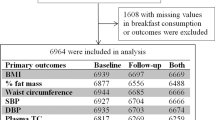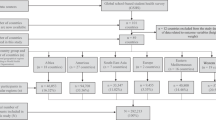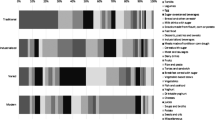Abstract
OBJECTIVES:
Reports of inverse associations between breakfast frequency and indices of obesity are predominantly based on samples of children from high-income countries with limited socioeconomic diversity. Using data from the International Study of Childhood Obesity, Lifestyle and the Environment (ISCOLE), the present study examined associations between breakfast frequency and adiposity in a sample of 9–11-year-old children from 12 countries representing a wide range of geographic and socio-cultural variability.
METHODS:
Multilevel statistical models were used to examine associations between breakfast frequency (independent variable) and adiposity indicators (dependent variables: body mass index (BMI) z-score and body fat percentage (BF%)), adjusting for age, sex, and parental education in 6941 children from 12 ISCOLE study sites. Associations were also adjusted for moderate-to-vigorous physical activity, healthy and unhealthy dietary patterns and sleep time in a sub-sample (n=5710). Where interactions with site were significant, results were stratified by site.
RESULTS:
Adjusted mean BMI z-score and BF% for frequent breakfast consumers were 0.45 and 20.5%, respectively. Frequent breakfast consumption was associated with lower BMI z-scores compared with occasional (P<0.0001, 95% confidence intervals (CI): 0.10–0.29) and rare (P<0.0001, 95% CI: 0.18–0.46) consumption, as well as lower BF% compared with occasional (P<0.0001, 95% CI: 0.86–1.99) and rare (P<0.0001, 95% CI: 1.07–2.76). Associations with BMI z-score varied by site (breakfast by site interaction; P=0.033): associations were non-significant in three sites (Australia, Finland and Kenya), and occasional (not rare) consumption was associated with higher BMI z-scores compared with frequent consumption in three sites (Canada, Portugal and South Africa). Sub-sample analyses adjusting for additional covariates showed similar associations between breakfast and adiposity indicators, but lacked site interactions.
CONCLUSIONS:
In a multinational sample of children, more frequent breakfast consumption was associated with lower BMI z-scores and BF% compared with occasional and rare consumption. Associations were not consistent across all 12 countries. Further research is required to understand global differences in the observed associations.
This is a preview of subscription content, access via your institution
Access options
Subscribe to this journal
We are sorry, but there is no personal subscription option available for your country.
Buy this article
- Purchase on Springer Link
- Instant access to full article PDF
Prices may be subject to local taxes which are calculated during checkout


Similar content being viewed by others
References
Wang YC, McPherson K, Marsh T, Gortmaker SL, Brown M . Health and economic burden of the projected obesity trends in the USA and the UK. Lancet 2011; 378: 815–825.
Gupta N, Goel K, Shah P, Misra A . Childhood obesity in developing countries: epidemiology, determinants, and prevention. Endocr Rev 2012; 33: 48–70.
Olds T, Maher C, Zumin S, Péneau S, Lioret S, Castetbon K et al. Evidence that the prevalence of childhood overweight is plateauing: data from nine countries. Int J Pediatr Obes 2011; 6: 342–360.
Vereecken C, Dupuy M, Rasmussen M, Kelly C, Nansel TR, Al Sabbah H et al. Breakfast consumption and its socio-demographic and lifestyle correlates in schoolchildren in 41 countries participating in the HBSC study. Int J Public Health 2009; 54: 180–190.
Arora M, Nazar GP, Gupta VK, Perry CL, Reddy KS, Stigler MH . Association of breakfast intake with obesity, dietary and physical activity behavior among urban school-aged adolescents in Delhi, India: results of a cross-sectional study. BMC Public Health 2012; 12: 881.
Doku D, Koivusilta L, Raisamo S, Rimpelä A . Socio-economic differences in adolescents' breakfast eating, fruit and vegetable consumption and physical activity in Ghana. Public Health Nutr 2013; 16: 864–872.
Rampersaud GC, Pereira MA, Girard BL, Adams J, Metzl JD . Breakfast habits, nutritional status, body weight, and academic performance in children and adolescents. J Am Diet Assoc 2005; 105: 743–760.
Szajewska H, Ruszczynski M . Systematic review demonstrating that breakfast consumption influences body weight outcomes in children and adolescents in Europe. Crit Rev Food Sci Nutr 2010; 50: 113–119.
Brown AW, Bohan Brown MM, Allison DB . Belief beyond the evidence: using the proposed effect of breakfast on obesity to show 2 practices that distort scientific evidence. Am J Clin Nutr 2013; 98: 1298–1308.
Betts JA, Richardson JD, Chowdhury EA, Holman GD, Tsintzas K, Thompson D . The causal role of breakfast in energy balance and health: a randomized controlled trial in lean adults. Am J Clin Nutr 2014; 100: 539–547.
Dhurandhar EJ, Dawson J, Alcorn A, Larsen LH, Thomas EA, Cardel M et al. The effectiveness of breakfast recommendations on weight loss: a randomized controlled trial. Am J Clin Nutr 2014; 100: 507–513.
Hallström L, Labayen I, Ruiz JR, Patterson E, Vereecken CA, Breidenassel C et al. Breakfast consumption and CVD risk factors in European adolescents: the HELENA (Healthy Lifestyle in Europe by Nutrition in Adolescence) Study. Public Health Nutr 2013; 16: 1296–1305.
Haug E, Rasmussen M, Samdal O, Iannotti R, Kelly C, Borraccino A et al. Overweight in school-aged children and its relationship with demographic and lifestyle factors: results from the WHO-Collaborative Health Behaviour in School-aged Children (HBSC) study. Int J Public Health 2009; 2: 167–179.
Hatami M, Taib MN, Jamaluddin R, Saad HA, Djazayery A, Chamari M et al. Dietary factors as the major determinants of overweight and obesity among Iranian adolescents. A cross-sectional study. Appetite 2014; 82: 194–201.
Duncan S, Duncan EK, Fernandes RA, Buonani C, Bastos KD, Segatto AF et al. Modifiable risk factors for overweight and obesity in children and adolescents from São Paulo, Brazil. BMC Public Health 2011; 11: 585.
Tin SP, Ho SY, Mak KH, Wan KL, Lam TH . Location of breakfast consumption predicts body mass index change in young Hong Kong children. Int J Obes 2012; 36: 925–930.
Raiah M, Talhi R, Mesli MF . Overweight and obesity in children aged 6-11 years: prevalence and associated factors in Oran. Sante Publique 2012; 24: 561–571.
Horikawa C, Kodama S, Yachi Y, Heianza Y, Hirasawa R, Ibe Y et al. Skipping breakfast and prevalence of overweight and obesity in Asian and Pacific regions: a meta-analysis. Prev Med 2011; 53: 260–267.
Dialekakou KD, Vranas PB . Breakfast skipping and body mass index among adolescents in Greece: whether an association exists depends on how breakfast skipping is defined. J Am Diet Assoc 2008; 108: 1517–1525.
Katzmarzyk PT, Barreira TV, Broyles ST, Champagne CM, Chaput JP, Fogelholm M et al. The International Study of Childhood Obesity, Lifestyle and the Environment (ISCOLE): design and methods. BMC Public Health 2013; 13: 900.
de Onis M, Onyango AW, Borghi E, Siyam A, Nishida C, Siekmann J . Development of a WHO growth reference for school-aged children and adolescents. Bull World Health Organ 2007; 85: 660–667.
Saloheimo T, González SA, Erkkola M, Milauskas DM, Meisel JD, Champagne CM et al. The reliability and validity of a short food frequency questionnaire among 9 to 11-year-olds: a multinational study on 3 middle income and high income countries. Int J Obes Suppl 2015 (this issue).
Mikkilä V, Vepsäläinen H, Saloheimo T, González SA, Meisel JD, Hu G et al. An international comparison of dietary patterns in 9-11-year-old children. Int J Obes Suppl 2015 (this issue).
Tudor-Locke C, Barreira TV, Schuna JM Jr, Mire EF, Katzmarzyk PT . Fully automated waist-worn accelerometer algorithm for detecting children's sleep-period time separate from 24-h physical activity or sedentary behaviors. Appl Physiol Nutr Metab 2014; 39: 53–57.
Evenson KR, Catellier DJ, Gill K, Ondrak KS, McMurray RG . Calibration of two objective measures of physical activity for children. J Sports Sci 2008; 26: 1557–1565.
Barreira TV, Schuna JM Jr, Mire EF, Katzmarzyk PT, Chaput JP, Leduc G et al. Identifying children’s nocturnal sleep using a 24-h waist accelerometry. Med Sci Sports Exerc 2015; 47: 937–943.
Manios Y, Moschonis G, Androutsos O, Filippou C, Van Lippevelde W, Vik FN et al. Family sociodemographic characteristics as correlates of children's breakfast habits and weight status in eight European countries. The ENERGY (EuropeaN Energy balance Research to prevent excessive weight Gain among Youth) project. Public Health Nutr 2014; 14: 1–10.
Sarmiento OL, Parra DC, González SA, González-Casanova I, Forero AY, Garcia J . The dual burden of malnutrition in Colombia. Am J Clin Nutr 2014; 100: 1628S–1635S.
Instituto Colombiano de Bienestar Familiar ICBF. Programa de Alimentación Escolar. Available at http://www.icbf.gov.co/portal/page/portal/PortalICBF/Bienestar/ProgramasyEstratégias/AlimentaciónEscolar (accessed on 4 September 2013).
Brug J, van Stralen MM, Te Velde SJ, Chinapaw MJ, De Bourdeaudhuij I, Lien N et al. Differences in weight status and energy-balance related behaviors among schoolchildren across Europe: the ENERGY-project. PLoS One 2012; 7: e34742.
Reddan J, Wahlstrom K, Reicks M . Children’s perceived benefits and barriers in relation to eating breakfast in schools with or without Universal School Breakfast. J Nutr Educ Behav 2002; 34: 47–52.
Shaw ME . Adolescent breakfast skipping: an Australian study. Adolescence 1998; 33: 851–861.
Sjöberg A, Hallberg L, Höglund D, Hulthén L . Meal pattern, food choice, nutrient intake and lifestyle factors in The Göteborg Adolescence Study. Eur J Clin Nutr 2003; 57: 1569–1578.
Deshmukh-Taskar PR, Nicklas TA, O'Neil CE, Keast DR, Radcliffe JD, Cho S . The relationship of breakfast skipping and type of breakfast consumption with nutrient intake and weight status in children and adolescents: the National Health and Nutrition Examination Survey 1999–2006. J Am Diet Assoc 2010; 110: 869–878.
Kamp Dush CM, Schmeer KK, Taylor M . Chaos as a social determinant of child health: reciprocal associations? Soc Sci Med 2013; 95: 69–76.
Sleddens EF, Gerards SM, Thijs C, de Vries NK, Kremers SP . General parenting, childhood overweight and obesity-inducing behaviors: a review. Int J Pediatr Obes 2011; 6: e12–e27.
Timlin MT, Pereira MA, Story M, Neumark-Sztainer D . Breakfast eating and weight change in a 5-year prospective analysis of adolescents: Project EAT (Eating Among Teens). Pediatrics 2008; 121: e638–e645.
Berkey CS, Rockett HR, Gillman MW, Field AE, Colditz GA . Longitudinal study of skipping breakfast and weight change in adolescents. Int J Obes Relat Metab Disord 2003; 27: 1258–1266.
LeBlanc AG, Katzmarzyk PT, Barreira TV, Broyles ST, Chaput J-P, Church TS et al. Are participant characteristics from ISCOLE study sites comparable to the rest of their country? Int J Obes Suppl 2015 (this issue).
Acknowledgements
We thank the ISCOLE External Advisory Board and the ISCOLE participants and their families who made this study possible. A membership list of the ISCOLE Research Group and External Advisory Board is included in Katzmarzyk et al. (this issue). ISCOLE was funded by The Coca-Cola Company. MF has received a research grant from Fazer Finland. RK has received a research grant from Abbott Nutrition Research and Development.
Author information
Authors and Affiliations
Consortia
Corresponding author
Ethics declarations
Competing interests
MF has received a research grant from Fazer Finland and has received an honorarium for speaking for Merck. AK has been a member of the Advisory Boards of Dupont and McCain Foods. RK has received a research grant from Abbott Nutrition Research and Development. VM is a member of the Scientific Advisory Board of Actigraph and has received an honorarium for speaking for the Coca-Cola Company. TO has received an honorarium for speaking for the Coca-Cola Company. JZ has received a grant from The British Academy/Leverhulme Trust. The remaining authors declare no conflict of interest.
Rights and permissions
About this article
Cite this article
Zakrzewski, J., Gillison, F., Cumming, S. et al. Associations between breakfast frequency and adiposity indicators in children from 12 countries. Int J Obes Supp 5 (Suppl 2), S80–S88 (2015). https://doi.org/10.1038/ijosup.2015.24
Published:
Issue Date:
DOI: https://doi.org/10.1038/ijosup.2015.24



